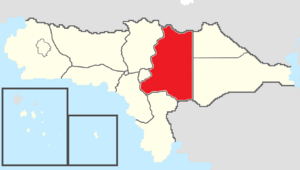Lyhoming
This article is incomplete because it is pending further input from participants, or it is a work-in-progress by one author. Please comment on this article's talk page to share your input, comments and questions. Note: To contribute to this article, you may need to seek help from the author(s) of this page. |
State of Lyhoming | |
|---|---|
State | |
| Nickname(s): The Frontier State (official) The Wild State | |
| Motto: | |
 Map of Rizealand with Lyhoming in red | |
| Country | |
| Before Statehood | Eastern Territory |
| Capital (and largest city) | McDowell |
| Joined Federation | November 8, 1890 (7th) |
| Government | |
| • Governor | Paul Barthelemy (TNC-CRP) |
| • Deputy Governor | Megan Campbell (TNC-CRP) |
| • Legislature | Lyhoming State Assembly |
| • Federal representation | Councilors
|
| Area | |
| • Total | 283,733.60 km2 (109,550.16 sq mi) |
| Population (2021) | |
| • Total | 6,016,900 |
| • Density | 21.21/km2 (54.9/sq mi) |
| Time zone | UTC+10 (Central) |
| Abbreviation | LY |
| ISO 3166 code | RZ-LY |
| Website | www |
Lyhoming, known officially as the State of Lyhoming and unofficially as "LY" or "Lyho", is a state in eastern Rizealand that is bordered by Cassier to the north, the Powhatan Nation to the northeast, Cahoka to the southeast, Marchenia and San Andreas to the south, Fáel and the Nehinaw Nation to the southwest, and Providence to the west. Lyhoming has a total area of 283,733.60 square kilometers, making it the second largest state and political division of Rizealand. Lyhoming also has a population of 6,016,900, making it the fourth most populous state and political entity in Rizealand. Lyhoming's capital and largest city is McDowell. It is also home to several other large cities including Shelby, Greendale, and Jedburg.
Etymology
The name "Lyhoming" is derived from the Powhatan word "Ly'homa'inke", meaning "river-crossed." The Powhatan used the name to refer to the Weanoke River which cuts through the center of the state.
Geography
Ecology
Climate
Conservation
Demographics
Population
Language
Religion
Health
Education
Urban Areas
Government and politics
The government of Lyhoming is established and organized according to the Constitution of Lyhoming. Because Lyhoming is a constituent state of Rizealand, the powers of its government are subject to certain limits by the Articles of Federation including the requirement of a democratic form of government and prohibitions on forming alliances with foreign governments, declaring war, raising or maintaining armies, establishing forms of currency, and placing unlawful restraints on interstate and international trade. In addition to constitutional restraints on state power, the Articles also allow the Central Assembly to enact legislation that can supersede state laws when involving national security, interstate commerce, foreign affairs, immigration, and the public's welfare. Like the federal government of Rizealand, the government of Lyhoming is divided into three branches of government.
The legislative branch consists of a unicameral State Assembly. The State Assembly's 85 seats are filled through closed party list proportional representation elections held every three years. As the state legislature, the State Assembly is responsible for enacting legislation and can do so with a simple majority, although a majority of two-thirds is required to override the Governor's veto, enact super laws, or remove government officials from office. The State Assembly is also responsible for approving the Governor's executive nominations.
The executive branch is headed by the following constitutional officers elected in statewide two-round direct elections at the same time as the State Assembly for three-year terms.
- The Governor is the head of state and government responsible for signing legislation into law, nominating executive agency heads, and enforcing the laws of the state.
- The Deputy Governor assists the Governor in carrying out his duties and becomes governor if the office falls vacant.
- The Attorney General is the chief legal officer of the state and is responsible for issuing formal opinions, enforcing state laws via the courts, representing the state in court, and overseeing all criminal prosecutions.
- The Public Safety Commissioner is the chief law enforcement officer of the state responsible for the oversight and command of state law enforcement agencies.
- The State Comptroller is responsible for collecting all tax revenue, managing state finances, and auditing state accounts.
- The Land Commissioner is responsible for overseeing the management of state public lands, natural resources, state parks, and mineral rights.
- The Agriculture Commissioner is responsible for the state's agricultural sector and the development of rural communities.
- The Commerce commissioners are responsible for the regulation of public utilities, enforcement of state antitrust laws, and registration of corporations in Lyhoming.
The judicial branch consists of the High Court, Court of Criminal Appeals, courts of appeals, and district courts. All justices and judges are elected in two-round direct elections for six-year terms.
There are also independent agencies and commissions established by the state constitution or state super laws that do not neatly fit into any branch of government, as they often enforce state laws (executive), issue rules and regulations (legislative), and adjudicate cases or claims (judicial). While their agency heads or commission members are usually nominated or appointed by the Governor, they can only be removed from office through impeachment and removal by the State Assembly.
Lyhoming has a common law legal system with some Estmerish influences. In addition to the protections of the Articles of Federation, the Lyhoming Constitution also establishes additional protections and gives citizens the right to recall state officials, refer legislation to a referendum vote, enact legislation via an initiative vote, and approve amendments to the state constitution.




